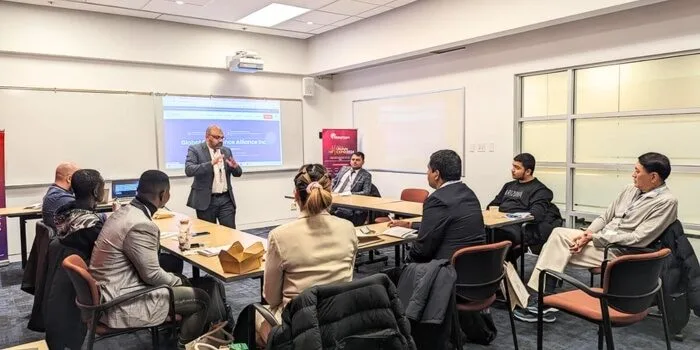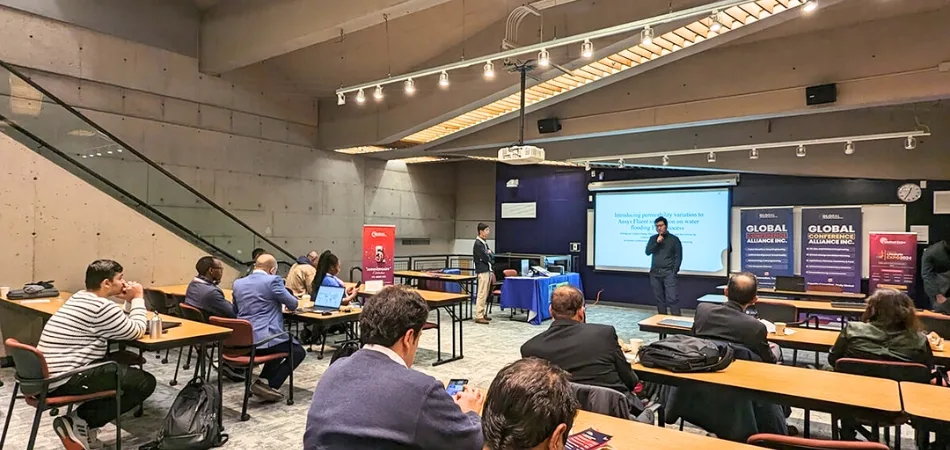Identifying the right conference can feel like finding a needle in a haystack when you’re suddenly planning one. With so many events competing for your attention, how can you figure out which ones are worth your time and investment? This is when a common question occurs: How do you know if a conference is reputable?
A reputable conference is like a lighthouse surrounded by noise. It basically offers valuable insights, networking opportunities, and credible speakers. Assessing its reputation involves analyzing its history, evaluating the background of organizers and speakers, and reviewing the feedback of attendees.
But there is more to it than that. Consider factors such as industry recognition, speaker expertise, and past participant experience. These elements provide a more comprehensive picture of a conference’s reputation.
This detailed blog will provide you with everything in one place. So, let’s find it out.
What Is A Reputable Conference?
A reputable conference is known for its structured format, credible speakers, and valuable discussions. These events bring together professionals, researchers, and experts to share meaningful insights. Whether through keynote speeches, panel discussions, or interactive sessions, a well-organized conference ensures that attendees gain useful knowledge that can be applied in real-world situations.
The credibility of a conference largely depends on its organizers, sponsors, and speakers. Events backed by well-known institutions or industry leaders tend to be more reliable. When experts and experienced professionals lead discussions, attendees can trust the information shared. A reputable conference also focuses on relevant and current topics, making it a valuable learning experience.
Another important factor is the quality of content and the overall experience it provides. Well-structured schedules, engaging discussions, and interactive sessions make a conference worth attending. Events that encourage questions, networking, and idea exchange offer more than just theoretical knowledge—they create opportunities for meaningful connections and professional growth.
Many countries host conferences that bring together experts from various fields. For example, places like Canada organize events that focus on education, technology, healthcare, and business. Those looking to attend well-structured events with insightful discussions may find various conferences in Canada that offer valuable learning opportunities while allowing them to connect with professionals in their industry.
Attendees of a Reputable Conference- Who Are They?
Conferences with a good reputation draw both professionals and academics. These meetups are essential for those looking to expand their networks and knowledge. Here are some of the attendees who contribute to these professional events:
Industry Professionals
Industry professionals attend to stay updated on the latest trends and technologies. They use conferences to network and gain insights that can be applied in their workplaces. Often, they are looking to meet collaborators for future projects. They may also be searching for solutions to specific challenges in their industry.
Researchers
Researchers attend reputable conferences to present their latest findings and engage in academic discussions. During these gatherings, innovative ideas are exchanged. Researchers benefit from feedback that can refine their work. Their contributions push the boundaries of knowledge in their fields.
Business Leaders
Business leaders look for opportunities to learn about new market trends and innovative management strategies. Conferences provide them with a platform to share experiences and learn from peers. They often participate in panels to discuss challenges and successes. Networking opportunities are also a significant draw for them.
PhD Students
A reputable conference gives PhD students exposure to their research and allows them to share it with a wider audience. Apart from that, the right number of conferences to attend as a PhD student must be determined to balance study and networking. These events provide valuable insights and opportunities for educational growth. Connecting with experts and peers improves their educational process.
Technology Enthusiasts
Technology enthusiasts are keen to explore the latest innovations and gadgets. They attend to witness product launches and tech demonstrations first-hand. These conferences offer them a chance to interact with inventors and creators. Staying ahead of technology trends is their primary goal.
Government and Policy Makers
Government officials and policymakers attend reputable conferences to stay informed about industry trends and developments. They seek knowledge that can inform policy decisions and regulatory frameworks. Networking with industry leaders and experts is also a key objective. Their participation helps bridge the gap between industry and government.
How Do You Know if A Conference Is Reputable?
A good knowledge of the conference’s reputation is crucial before participating. A reputable conference not only expands knowledge but also develops professional networks. The following methods can help you decide whether a conference is worth your time and money.
Historical Success
Look at the conference’s track record for successful past events. Consistent positive outcomes are strong indicators of a reputable conference. Analyze how these events have evolved and improved over time. A history of excellence suggests a commitment to quality.
Organizer Credibility
Check out the reputation and experience of the conference organizers. Organizers with a solid industry background typically deliver quality events. Check their professional affiliations and past projects. Reputable organizers are the key to ensuring a conference’s success.
Speaker Quality
Take a look at the expertise and standing of the speakers invited to the conference. Having speakers who are leaders in their fields strengthens a conference’s credibility. They bring valuable insights and draw more attendees. Speaker selection reflects the overall quality of the event.
Attendee Feedback
Read reviews and testimonials from previous participants. Positive feedback, especially regarding organizational quality and content value, indicates a reputable conference. Look for repeated attendance, as it shows ongoing satisfaction. Negative reviews can provide insight into areas needing improvement.
Industry Recognition
Consider whether the conference is recognized or endorsed by respected entities within the industry. Awards, certifications, or partnerships with academic institutions increase a conference’s standing. Recognition from industry leaders or professional organizations adds a layer of credibility. Such endorsements are signs of a reputable conference.
Networking Opportunities
Assess the conference’s networking opportunities. Good conferences encourage interactions that can lead to professional advancement. Check if there are structured networking sessions or social events. The potential for making valuable connections is a significant measure of a conference’s worth.
Content Relevance and Innovation
Examine the relevance and innovativeness of the topics covered during the conference. A focus on current or timely issues attracts knowledgeable participants. See if the content aligns with current trends and future directions in your field. Conferences that push knowledge boundaries are usually reputable.
A conference’s reputation can be determined by multiple factors, including its history and organizers, as well as its speakers and content. When you critically evaluate these elements, you can pick conferences that are going to benefit your professional and personal development. Observe these indicators for signs of a good or bad conference to make informed decisions.
Advantages of Selecting a Reputable Conference
You will get plenty of advantages from choosing a reputable conference. From valuable networking opportunities to expert insights, attending a well-regarded event can offer numerous benefits to professionals and enthusiasts alike. Take a look at the advantages of selecting a reputable conference:
Access to Industry Leaders
Reputable conferences often feature keynote speakers and panelists who are influential figures in their respective fields. Engaging with these industry leaders provides invaluable insights and opportunities for professional development.
Quality Content and Presentations
Attendees of reputable conferences can expect high-quality content and engaging presentations. From cutting-edge research to practical strategies, these events offer a wealth of information that can enrich your knowledge and skills.
Networking Opportunities
One of the greatest advantages of attending a reputable conference is the chance to network with like-minded individuals and potential collaborators. Whether it’s during sessions, workshops, or social events, networking can lead to valuable connections and partnerships.
Enhanced Credibility and Recognition
Participating in a reputable conference can enhance your own credibility and recognition within your industry or field. Sharing insights, presenting research, or participating in panel discussions can showcase your expertise and establish you as a thought leader.
Opportunities for Collaboration
Reputable conferences often attract a diverse array of professionals, creating opportunities for collaboration and partnership. Whether it’s forming research collaborations or exploring business ventures, these events foster connections that can lead to fruitful collaborations.
Exposure to Emerging Trends
Attending a reputable conference allows you to stay updated on the latest trends and developments in your industry or field. From emerging technologies to shifting market trends, these events provide valuable insights that can inform your future strategies and decisions.
Professional Development
Many reputable conferences offer workshops, seminars, and training sessions designed to enhance attendees’ skills and knowledge. These opportunities for professional development can help you stay competitive in your field and advance your career trajectory.
Inspiration and Motivation
It can be quite encouraging and motivating to spend time in a respectable conference setting. Engaging with passionate speakers, networking with peers, and learning from success stories can reignite your enthusiasm for your work and spark new ideas and initiatives.
A reliable conference can offer a variety of benefits, such as networking opportunities, access to business executives, high-caliber content, and increased credibility. By investing your time and resources in these well-regarded events, you can take your professional growth and networking to new heights.
Tips to Avoid Mistakes While Attending a Reputable Conference
You can significantly increase your professional development and networking possibilities by attending a reputable conference. However, to maximize the benefits, it’s essential to avoid common mistakes. Here are some tips to make the most of your conference experience:
- Prepare in Advance: Research the topics and speakers before the event to plan your schedule effectively. This preparation helps you identify a reputable conference and optimize your attendance.
- Follow the Agenda: Be sure not to miss any important sessions by sticking to the schedule. It’s important to be flexible, but prioritize events that align with your goals.
- Manage Your Time Wisely: Avoid overloading your schedule by selecting sessions that align with your goals. Prioritize quality over quantity for a meaningful experience.
- Network Strategically: Don’t just hand out business cards; engage in meaningful conversations. Focus on building lasting relationships, not just quick contacts.
- Stay Focused During Sessions: Avoid distractions like checking your phone or chatting with others. Staying present allows you to fully absorb the information shared.
- Ask Thoughtful Questions: Don’t hesitate to ask relevant questions during sessions. Thoughtful inquiries demonstrate engagement and can lead to valuable discussions.
- Rest and Recharge: Allow time to rest between sessions to maintain your energy levels. Staying refreshed will help you stay focused and engaged throughout the conference.
FAQs About How Do You Know If a Conference Is Reputable?
Determining whether a conference is reputable is essential for making the most of your time and investment. A well-regarded conference can significantly improve your knowledge and professional network. Below are some frequently asked questions to help you assess a conference’s reputation:
What Should I Look for in Conference Reviews?
Look for repeated mentions of high-quality content, professional organization, and excellent networking opportunities. Reviews should reflect overall attendee satisfaction and conference impact on professional growth.
How Does the Diversity of Topics Affect a Conference’s Credibility?
A diverse range of topics that cover current trends and innovations can indicate a conference’s commitment to broad professional development. Such diversity also attracts experts and attendees.
What Types of Awards Should I Look for in a Conference?
Look for awards recognizing outstanding content, innovative presentations, or exemplary organization. Such awards often indicate a commitment to quality and can increase a conference’s credibility and appeal.
What Are the Risks of Attending Conferences with Limited Information?
Attending conferences with limited information poses risks, such as wasting time and resources. Without proper research, you may find the content irrelevant or the networking opportunities minimal, leading to a disappointing experience.
How Can I Utilize Social Media to Gauge a Conference’s Reputation?
Utilizing social media can help assess a conference’s reputation through attendee posts, reviews, and feedback. Engaging with conference hashtags or following related accounts can provide real-time insights into the event’s impact.
Conclusion
Evaluating a conference’s reputation is essential for maximizing the value of your attendance. By carefully considering factors such as the organizer’s track record, speaker expertise, and attendee feedback, you can make informed decisions about which events to prioritize.
Remember to dive into the conference’s history, scrutinize the credentials of organizers and speakers, and gauge attendee satisfaction. This diligent approach ensures that your time and resources are invested in conferences that offer genuine value and opportunities for growth.
This blog has everything if you don’t know: how do you know if a conference is reputable? By conducting thorough research and considering multiple factors, you can confidently identify reputable conferences worth attending.








